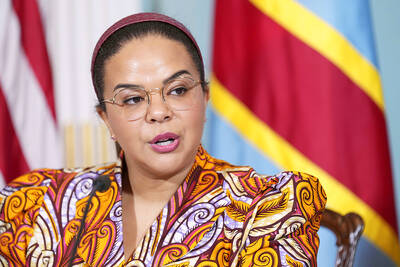A top UN human rights envoy likened military-ruled Myanmar's constitution-drafting assembly to "mass house arrest" yesterday and said he had no idea why the junta still held democracy icon Aung San Suu Kyi.
Paulo Sergio Pinheiro, who has twice been denied entry to the former Burma since a visit last November, said he did not understand why the junta had falsely promised to release the Nobel peace laureate after a year of detention.
It had also reneged on commitments to ease restrictions on her National League for Democracy (NLD) party in time for last month's start of the constitutional National Convention without providing any explanation, he said.
"It's a mystery for me," Pinheiro told reporters in the Thai capital. "I am terribly depressed and sad."
He also poured scorn on the junta's "roadmap to democracy," which is meant to pave the way to multiparty rule after 42 years of military dictatorship, including a 1990 election in which the NLD won a landslide victory only to be denied power by the army.
"The roadmap has had a most regrettable launching," he said, going on to describe the National Convention -- the first step of the roadmap -- as an "enormous effort for a meaningless and undemocratic exercise."
"The [government] has condemned those 1,088 people to house arrest," he said, adding that democratic transition would be impossible unless Myanmar's generals eased curbs on free or open discussion at the convention.
The convention is being held at a tightly-guarded compound outside Yangon, where delegates are banned from criticizing the state or disclosing information. Delegates have been urged to avoid bathing at inappropriate times and not eat junk food.
"If you go through this path, you will not be successful. It will not work. This has not worked in Brazil, in Uruguay, in Argentina, in Portugal, in Spain, in the Philippines, in Indonesia. This political transition will not work. It will not work on the moon. It will not work on Mars," he said.

STEPPING UP: Diminished US polar science presence mean opportunities for the UK and other countries, although China or Russia might also fill that gap, a researcher said The UK’s flagship polar research vessel is to head to Antarctica next week to help advance dozens of climate change-linked science projects, as Western nations spearhead studies there while the US withdraws. The RRS Sir David Attenborough, a state-of-the-art ship named after the renowned British naturalist, would aid research on everything from “hunting underwater tsunamis” to tracking glacier melt and whale populations. Operated by the British Antarctic Survey (BAS), the country’s polar research institute, the 15,000-tonne icebreaker — boasting a helipad, and various laboratories and gadgetry — is pivotal to the UK’s efforts to assess climate change’s impact there. “The saying goes

Floods on Sunday trapped people in vehicles and homes in Spain as torrential rain drenched the northeastern Catalonia region, a day after downpours unleashed travel chaos on the Mediterranean island of Ibiza. Local media shared videos of roaring torrents of brown water tearing through streets and submerging vehicles. National weather agency AEMET decreed the highest red alert in the province of Tarragona, warning of 180mm of rain in 12 hours in the Ebro River delta. Catalan fire service spokesman Oriol Corbella told reporters people had been caught by surprise, with people trapped “inside vehicles, in buildings, on ground floors.” Santa Barbara Mayor Josep Lluis

Police in China detained dozens of pastors of one of its largest underground churches over the weekend, a church spokesperson and relatives said, in the biggest crackdown on Christians since 2018. The detentions, which come amid renewed China-US tensions after Beijing dramatically expanded rare earth export controls last week, drew condemnation from US Secretary of State Marco Rubio, who on Sunday called for the immediate release of the pastors. Pastor Jin Mingri (金明日), founder of Zion Church, an unofficial “house church” not sanctioned by the Chinese government, was detained at his home in the southern city of Beihai on Friday evening, said

SANCTIONS: Congolese Minister of Foreign Affairs Therese Kayikwamba Wagner called on the EU to tighten sanctions against Rwanda during an event in Brussels The Democratic Republic of the Congo (DR Congo) has accused the EU of “an obvious double standard” for maintaining a minerals deal with Rwanda to supply Europe’s high-tech industries when it deployed a far-wider sanctions regime in response to the war in Ukraine. Congolese Minister of Foreign Affairs Therese Kayikwamba Wagner urged the EU to levy much stronger sanctions against Rwanda, which has fueled the conflict in the eastern DR Congo, describing the bloc’s response to breaches of the DR Congo’s territory as “very timid.” Referencing the EU’s response to Russia’s invasion of Ukraine, she said: “It is an obvious double standard